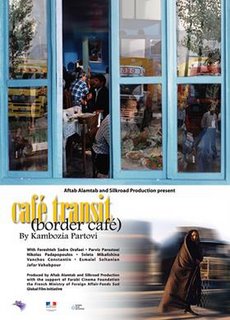
[See below a review in English]


Avec Fereshteh Sadr Orfani, Parviz Parastui, Nikolas Papadopoulos
Salles de cinéma : MK2 Beaubourg (Paris 3ème), Espace Saint-Michel (Paris 5ème), Le Studio des Ursulines (Paris 5ème)
S'affranchir du joug masculin... et se lancer dans la restauration pour prendre son indépendance. Tout un programme, déjà exploité par le cinéma contemporain : on pense à 'Bagdad Café', ou au plus récent 'Volver'. Dans chacun de ces films, une femme doit se prendre en charge après la disparition de son homme, aidé en cela par sa progéniture ou par d'autres femmes. Dans 'Café Transit', cette prise en charge a des allures de parcours du combattant : évidemment, le cadre de l'Iran rural rend ce combat plus que difficile. Reyhan, constamment harcelée par son beau-frère n'a de cesse de faire front face à l'intolérance et aux coutumes de son pays. Le film dresse son très beau portrait. Portrait d'une femme déterminée, qui défend avec âpreté les valeurs qui lui semblent justes. Portrait aussi d'une veuve éplorée, qui se prend à se laisser séduire mais qui ne perd jamais de vue son objectif. Jamais poseur, le film ne cède pas à la facilité d'un dénouement trop heureux ou d'une histoire d'amour trop attendue. Il se concentre justement sur ses personnages ainsi que sur la description d'une culture souvent enferrée dans ses clichés. L'art culinaire iranien, que manie l'héroïne avec dextérité sert de liant à tous les protagonistes, qui se retrouvent, malgré les barrières de langue, dans ce café. Tout le film est construit autour de Reyhan : chacun des personnages nous fait partager ses impressions, son témoignage par rapport à l'expérience qu'ils ont pu partager avec elle. Ce traitement lui confère une aura mythique. Tels ces compagnons de route, nous nous retrouvons comme abandonnés par cette femme exceptionnelle lorsque le film s'achève.
Marylène Khouri
(source : http://www.evene.fr/culture/agenda/cafe-transit-12605.php)
Café Transit / Ghaveh Kaneh (Iran-France)
By Robert Koehler
A widow's efforts to run a truck-stop diner near the Iran-Turkey border becomes a lesson in stifling patriarchy in Kambozia Partovi's elegant "Cafe Transit." Since he last directed in 1997 with "Naneh Lala," Partovi has become perhaps Iran's most impressive screenwriting voice, first and foremost on "The Circle," as well as with beautifully spare scripts for "Earth and Ashes" and "The Deserted Station." "Transit's" feminist polemics are in line with his work on "I Am Taraneh, Fifteen Years Old," but "Transit" is more successful dramatizing a woman's dilemmas. Pic should find a host of international buyers for specialty customers, abetted by strong fest play.
Prizes at this year's Fajr fest for Partovi's script and Fereshteh Sadre Orafaei ("The Circle," "The White Balloon") as widow Reyhan prove worthy, as each plays a crucial role in the film's emotional and sociopolitical dimensions.
With the death of husband Ismael, who owned and operated a successful roadside diner known in Farsi as a "ghaveh kaneh" (the pic's Farsi title), Reyhan feels the need to keep the family business going. In many Islamic countries, her wishes would be respected; contempo Iran, with its often extreme laws and traditions favoring men, once again provides grist for Partovi.
Bossy, conservative brother Nasser (Parviz Parastoei, in a darker mode than his witty con man in "The Lizard") won't hear of Reyhan's dreams, and demands she and her two daughters move into his compound, where he quickly builds rooms for them. Nasser is no beast; he's simply following tradition, which calls for the surviving brother to take responsibility for his brother's family.
Quietly but firmly, Reyhan refuses Nasser's offer to open a tiny operation adjoining his own restaurant, and after her eldest daughter is yanked by Nasser out of a rug-making operation, Reyhan takes the bull by the horns. She cleans up the cafe, asks Ojan (Esmaiel Soltanian) to return to his old job as waiter, opens the doors and finds herself flooded with hungry, thirsty and grateful long-haul truckers.
A few flash-forwards and flashbacks show off the stylish presence of editor Jafar Panahi, director of "The Circle" and "Crimson Gold" and a frequent Partovi collaborator. The pacing is masterful in the pic's pressure-cooker atmosphere as Reyhan hides in the kitchen from Nasser and local authorities. The friendly presence of Greek trucker Zacharia (Nikolas Padapopoulos) hints at a possible but futile romantic entanglement for Reyhan.
Orafaei's approach to her character isn't as a doomed woman, but as a survivor. It's a performance that burns steadily and quietly, with few explosions, and helps steer the film away from emotional excess. Support from an international cast is assured.
Partovi remains a more gifted writer than director, but he's backed by an aces crew led by up-and-coming lenser Mohammad Reza Sokout.
(source : www.variety.com (12 October 2005) http://www.variety.com/review/VE1117928530.html?categoryid=31&cs=1)
No comments:
Post a Comment